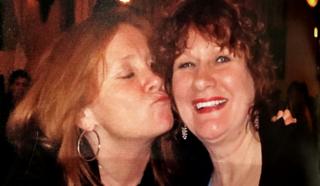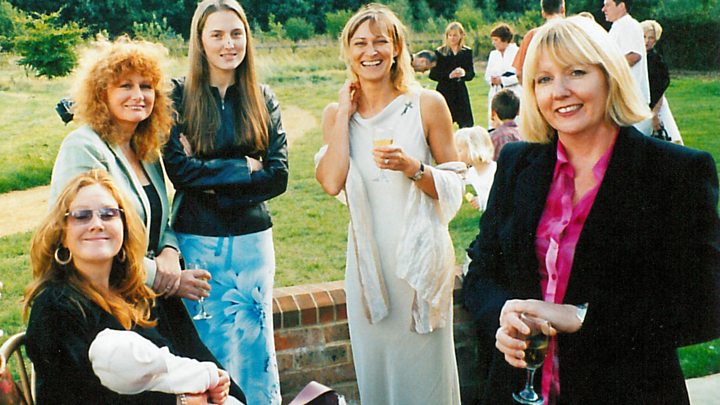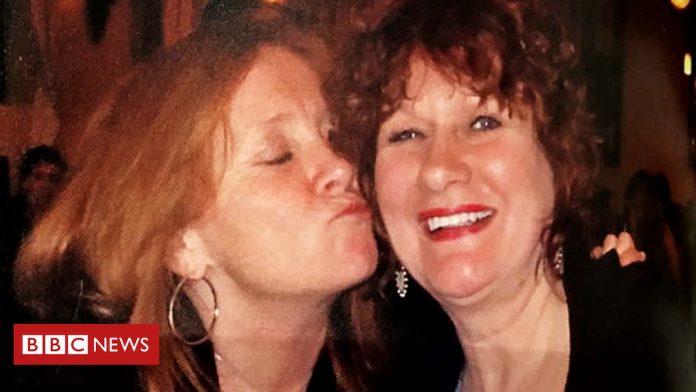[ad_1]

Sue and one of her “second mums”, Wendy
They say you can’t choose your family – but why not? Sometimes an extra mother figure is just what you need, says Sue Elliott-Nicholls.
I’m a mum collector. I’ve got a few of them – spare mums, just in case I need them, different varieties, one for every occasion.
Of course, many people are perfectly happy with the one they’ve got. A mum, living not too far away, who they can share life’s highs and lows with, skip down a sunny hillside with while eating strawberries, laughing and casting each other loving glances. Well, good for you, strawberry-eaters, but we can’t all be like you.
I was adopted, so perhaps that is why I’ve always sought out spare mothers – just in case I lose another one.
My adoptive mum is old-school. She has a sharp tongue, a quick wit and when we were kids she had our backs – but she didn’t put up with any nonsense. She survived a war in London and as a child she saw the doodlebugs come down. She is tough, and expected us to be too.
As she once said to my sister and me, as we shared a fag on her bed: “It’s a nice life girls, if you don’t weaken.”
But sometimes I longed for someone who would put up with my nonsense.
I found that person when I was 14. Susie was a youth theatre director – funny, kind and mischievous.
She took me under her wing and guided me through some really difficult times. She approved of me when others didn’t – she “got” me, and I spent many happy nights at her house with her family.
Sue and Susie
To me, creating a second family is a positive example of the resilience of the human spirit, and I’ve since discovered that I’m not the only one to use this coping strategy.
For my friend Daisy, it was Pam who saw her through her rocky teenage years. It was a little awkward, because Pam was her mum’s best friend, but she helped Daisy to get some perspective on that tricky teenage daughter/mother relationship, and move on from the door-slamming phase.
“I was very open and confessional with my second mum and just a horrible teenager to my actual mum,” says Daisy. ” It was kind of like having a parent who just liked you. And she didn’t judge.”
Daisy and Pam became really close, and would go out for the evening together – they even had their own secret language. Daisy loved the fact that this mum-aged woman would want to hang out with her.
Daisy is now a mother herself
That’s one of the joys of the second mum. She’s the cool older woman who likes you and understands you and can help you find your way through life when you get a bit lost.
This is why I value my second “second mum”, Wendy, a hard-partying, rock-and-roll American who gave me my first job – looking after her two children. I quickly became part of the new family she had gathered around her, having left most of her family behind in the US.
Her gigantic velvet sofa hosted just about every broken-hearted, temporarily homeless waif and stray that crossed her path.
It was on that sofa that I met Janey, “second mum” number three. She was getting divorced, and had moved in to Wendy’s house with her daughter for a while. Not one to miss an opportunity, I immediately adopted her as well.
It’s an arrangement that suits us well.
Sue, Wendy and Janey – like family
Janey sums it up: “It’s when your real family just didn’t deliver, for whatever reason – emotionally, intellectually, physically – and so you have to create another.”
Between them, Wendy and Janey have a whole filing cabinet full of life experiences for me to draw on. Whatever I’m going through, they’ve probably been through something similar themselves.
And to my children, they’re family too. Only Auntie Wendy can get a kiss from a 16-year-old who has come home from a party at 3am IN FRONT OF HIS MATES.
When my partner had cancer, Wendy and Janey rolled up their sleeves. We had a rough few months of treatment ahead and kids to support, and never for one moment did I feel I was going through it alone.
But as well as the love, support and guidance they have given me over the years, we like each other. We have a bond, a connection, a sense of humour in common, we have a laugh.
Second mums also make fewer demands than real mums – a point illustrated by Lisa and June.
They had an age difference of more than 40 years – what connected them was that they defied their families’ expectations.
Both were expected to marry “nice Jewish boys” and settle down in North London – but they had a need to travel and spread their wings. Lisa became an actress and drama teacher and June a successful writer.
June with Lisa’s daughter – and Lisa
When we met to discuss their relationship, Lisa let me into June’s flat using her own key – she would pop in most days.
“I tend to veer towards people that are like me, but Lisa does things that surprise me, that I would never accept from other people,” June told me.
“I just take her as she comes.”
A few weeks after we met, June died – she was 91. Now Lisa has to do without her.
My original “second mum”, Susie, also died recently and she has left such a massive hole in my world.
It feels different from losing a friend or a family member – I don’t know how to feel, or what I’m allowed to feel.
I don’t want to steal the thunder from her real family, but I miss her so very much.
Susie during a rehearsal in the 1980s
Being chosen as a second mum is an unexpected benefit of age.
Imagine my joy when one of my colleagues, Tee, referred to me as a second mother.
I didn’t mind one bit that a grown woman thinks of me as a mother figure (well, maybe one bit – but the other 99 little bits were jumping with joy). I’m a second mum. I’ve evolved!
Tee has a great relationship with her own parents (I’m not trying to steal her, honest Mrs Tee) but they’re all the way up in Aberdeen, so she needed someone that she could talk to about the challenges of trying to survive in London.
I shyly ask what makes our relationship different to that with a friend or mentor.
“You can have very serious conversations about work, get a different perspective on things, but then you can just hang out and have a gossip and a laugh, whereas you would try and impress a mentor,” she replies.
I see her as a younger, slightly calmer, version of myself and I genuinely want to know what is going on with her life, to help her get it right.
“I think with second families you care about them, you really want a good outcome for them,” says Janey.

Media playback is unsupported on your device
Maybe it’s a by-product of adoption, the ability to suspend your disbelief about who is family: I have a sister, Sally, who came to live with us when she was 14. We’ve been sisters ever since, even though technically – legally, biologically – we are not. But we’re there for each other, and that’s what makes us sisters – unconditional love.
I recently traced my biological mother, so technically I now really do have two mums. I love my mums, both of them, but I still don’t see why I shouldn’t have a few extras up my sleeve, you know, just in case.
Join the conversation – find us on Facebook, Instagram, YouTube and Twitter.
[ad_2]




